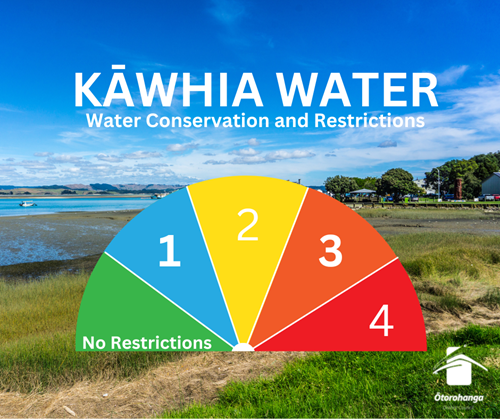Conserving water is everyone's responsibility
Water for communities in and around Ōtorohanga, Kāwhia, Tihiroa and Arohena comes directly from small rivers, streams and springs and is permitted by consents from the Waikato Regional Council. These consents specify limits that the Council must stay under, so it is important that we all do our best to conserve water particularly in summer, otherwise restrictions may be put in place.
Summer water use – tips for conserving water
In the house
- Keep a jug of cold water in the fridge so you don't have to run the tap for cold drinking water.
- Aerated taps are inexpensive and can reduce water flow by 50%.
- Use dishwashers for full loads only.
- Keep showers short - ideally five minutes or less. Install a low flow shower head.
- Use washing machines for full loads only.
- Use water efficient appliances - all new appliances have a water efficiency labelling rating on them
In the garden
- Check outside pipes, taps and sprinklers and repair any leaks promptly.
- Report any leaks on the road or the footpath to the Council.
- Use water sparingly, especially on hot days when water is in highest demand.
- Water gardens either early in the morning or in the evening to avoid evaporation.
- Minimise use of sprinklers or unattended flowing hoses that use a huge amount of water - typically at least 15 litres of water a minute - that’s almost 1000 litres (a tonne of water!) per hour.
- Mulch garden beds to hold moisture in during hot dry weather.
- Install a water tank to catch roof water for later use watering the garden.
Kāwhia water

The population of Kāwhia can swell from around 500 to close to 3000 during summer which places pressure on the limited spring-fed water supply, so water restrictions are put in place from December. Information about water restrictions starting, changing or ending are found on the ODC website and on social media. Also, the indication arrow on the physical sign in Kāwhia township will be pointing to the current restriction level which is as follows:
Level 1 – Water conservation
USE WATER WISELY (BLUE)
- Sprinkler use allowed between 6-8am and 6-8pm.
- Hand-held hosing is allowed anytime.
- Water saving tips – see tips for conserving water above.
Level 2 - Water restriction
REDUCE NON-ESSENTIAL WATER USE (YELLOW)
- Use sprinklers on alternate days between 6-8am and 6-8pm (e.g. even street numbers on even days; odd street numbers on odd days).
- Hand-held hosing is allowed at any time.
Level 3 - Water restriction
REDUCE YOUR WATER USE IMMEDIATELY (ORANGE)
- No sprinklers allowed.
- Hand-held hosing only.
- Don’t use Council water supply to fill or top up your pools - including portable and paddling pools.
- Use a broom instead of water to clean hard surfaces such as footpaths and driveways.
- Avoid using water to wash windows, buildings, cars and boats (boat motors may be flushed out).
Level 4 - Water Restriction
ESSENTIAL WATER USE ONLY (RED)
- Water can be used for drinking, food preparation, hygiene and sanitary purposes - includes washing clothes and taking showers.
- Water may be used for activities like firefighting and emergency clean ups.
- No outdoor water use e.g. sprinklers, hoses, drip lines, irrigation systems, water toys like slip n' slides. You can only water your garden using collected rain water and/or grey water from inside your home.
- No filling of swimming pools - includes portable or paddling pools.
- No outdoor cleaning - cars, property and boats (boat motors may be flushed out).
Water restrictions help everyone play their part. They are put in place to protect our limited resource and make sure there is enough water for everyone to use during this time.
If you notice a water leak or someone wasting water in your street, please contact us immediately.